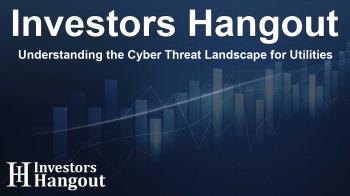Understanding the Cyber Threat Landscape for Utilities

Cybersecurity Threats Facing Utility Providers
A recent study has highlighted a concerning trend regarding cybersecurity threats directed towards water and electric utilities. The findings indicate that a staggering 81% of cyberattacks on these utilities compromise critical identity management systems, including widely-used platforms like Active Directory, Entra ID, and Okta.
The Scale of Cyberattacks
In a significant analysis, Semperis examined cyberattacks impacting utility operators in various regions. The report reveals that 62% of utility operators experienced cyber threats over the past year, with 80% of them being targeted multiple times. Alarmingly, more than half of these organizations reported either permanent corruption or destruction of their data and systems.
Recent High-Profile Attacks
Notably, recent attacks, particularly those linked to nation-state actors, underscore the vulnerabilities inherent in critical infrastructure. For example, a public utility was compromised by a group related to Volt Typhoon, demonstrating the pressing need for increased cybersecurity measures. Additionally, American Water Works, the largest water utility in the United States, experienced unauthorized activities within its network, affecting customer services and billing operations.
Need for Increased Vigilance
Despite the evident threats, more than a third of utility operators are unaware of potential attacks, reflecting an unsettling complacency in cybersecurity awareness. Experts urge these organizations to acknowledge the reality of possible breaches and work towards more robust defenses. Chris Inglis, the former U.S. National Cyber Director, emphasized that many utilities might not realize the infiltration of their systems, particularly by groups like Volt Typhoon that employ sophisticated tactics to remain undetected.
Public Safety Risks and Impacts
The implications of compromised utilities are significant — disruptions to electricity, heat, or clean water can pose severe risks to public health and safety. The Semperis study suggests that while many utility customers have, to date, been fortunate, the threats are imminent and must be addressed through improved cybersecurity practices.
Enhancing Operational Resilience
Mickey Bresman, CEO of Semperis, asserts the need for utilities to enhance resilience against these cyber threats. The focus must shift from reactive measures to proactive ones, ensuring that organizations prepare for breaches. This means conducting tabletop exercises to simulate potential attack scenarios, helping teams to better respond to real cybersecurity threats.
Strategies to Combat Cyber Threats
To bolster resilience, utility companies should consider the following approaches:
- Identify Crucial Infrastructure: Determine Tier 0 components essential for recovery from cyber incidents.
- Prioritize Responses: Formulate a response hierarchy starting with critical systems before addressing less crucial functions.
- Document Processes: Clearly outline response protocols and regularly practice them using realistic scenarios that involve different departments.
- Secure Recovery: Focus on implementing measures that ensure the security and integrity of backups, as attackers often attempt to disrupt recovery efforts.
The comprehensive study analyzed responses from IT and security professionals at numerous utility companies, offering insights into the cybersecurity landscape across different regions.
Ongoing Commitment to Cyber Resilience
As organizations navigate these challenges, Semperis continues to offer solutions that enhance identity security and resilience against cyberattacks. Their technology is tailored to protect critical identities in hybrid environments, aiming to safeguard against data breaches and operational mishaps.
In an era where cyber threats are ever-evolving, maintaining robust defenses and a proactive stance is essential for utility operators to protect not only their infrastructure but also the communities they serve. By adopting a holistic approach towards cybersecurity, utilities can fortify their systems, ensuring that public safety remains a top priority.
Frequently Asked Questions
What is the main finding of the Semperis study?
The study found that a significant percentage of cyberattacks on utility companies compromise identity management systems, threatening public safety and operational stability.
How many utility operators were targeted by cyberattacks?
According to the study, 62% of utility operators experienced cyberattacks in the previous year, with many facing multiple attacks.
What impact do cyberattacks have on utilities?
Cyberattacks can lead to the corruption or destruction of data and systems, affecting essential services like electricity and clean water.
What recommendations does Semperis provide for utilities?
Semperis recommends utilities focus on identifying crucial infrastructure components, prioritizing incident response, documenting processes, and emphasizing secure recovery methods.
Why is it crucial for utilities to improve cybersecurity?
Improving cybersecurity is vital to protect public health and safety, as compromised utilities can lead to significant risks for communities.
About The Author
Contact Caleb Price privately here. Or send an email with ATTN: Caleb Price as the subject to contact@investorshangout.com.
About Investors Hangout
Investors Hangout is a leading online stock forum for financial discussion and learning, offering a wide range of free tools and resources. It draws in traders of all levels, who exchange market knowledge, investigate trading tactics, and keep an eye on industry developments in real time. Featuring financial articles, stock message boards, quotes, charts, company profiles, and live news updates. Through cooperative learning and a wealth of informational resources, it helps users from novices creating their first portfolios to experts honing their techniques. Join Investors Hangout today: https://investorshangout.com/
The content of this article is based on factual, publicly available information and does not represent legal, financial, or investment advice. Investors Hangout does not offer financial advice, and the author is not a licensed financial advisor. Consult a qualified advisor before making any financial or investment decisions based on this article. This article should not be considered advice to purchase, sell, or hold any securities or other investments. If any of the material provided here is inaccurate, please contact us for corrections.

